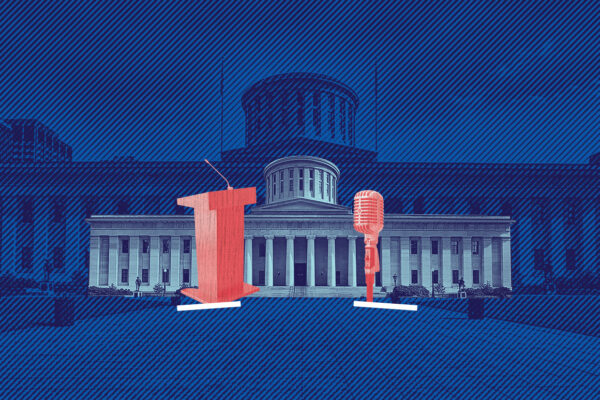Thank you Chair Roegner, Vice Chair Gavarone, Ranking Member Blackshear and members of the Senate General Government Committee for the opportunity to provide opponent testimony to Senate Bill 293 (SB 293). My name is Collin Marozzi, and I serve as the Advocacy Director for the American Civil Liberties Union of Ohio. The ACLU of Ohio is a one hundred-and-five-year-old organization dedicated to protecting our constitutional rights and expanding our civil liberties. We have the honor of being supported by over 38,000 Ohioans from all 88 counties.
Arbitrarily cutting off the mail-in ballot return deadline by four days will cost thousands of eligible voters from having their ballots counted. Through potentially no fault of their own, Ohio voters will be silenced and their votes discarded. Vulnerable voters who rely on mail-in ballots, voters like senior citizens, the disabled, homebound, or otherwise confined individuals, will be singled out for no other reason than lawfully casting ballots via a method that has been targeted by President Trump. If SB 293 becomes law, some of these perfectly lawful voters will have perfectly lawful ballots thrown out. Last week, it was revealed the Trump Administration has apparently been threatening Ohio unless we change our election law. It cannot be overstated how inappropriate it is for a federal officeholder with no constitutional authority to regulate elections¹ to threaten states with the Department of Justice unless, and until they enact his preferred policies for election administration. At best it’s an insult to federalism, and political coercion at worst.
Furthermore, the supposed legal authority presented to this committee, intended to justify this latest iteration of voter suppression, has been mischaracterized. A single opinion from the 5th Circuit Court of Appeals is utterly insufficient to support a claim that this is settled federal law. To the contrary, this opinion is an outlier. In 2020, the US Supreme Court let stand a ruling from the Pennsylvania Supreme Court allowing postmarked ballots to be counted if received by election administrators up to three days after Election Day.² The Pennsylvania Supreme Court ruling was an expansion of state law in response to the COVID-19 pandemic, and the Supreme Court still let the order stand. Per Pennsylvania state law, mail-in ballots must be received by Election Day to be counted, but the PA Supreme Court allowed postmarked ballots to be counted anyway so long as they were received three days after Election Day. This cuts against any notion that the Supreme Court would break precedent and interpret the scant federal law on this subject as definitively prohibiting any state to receive ballots post-Election Day.
Moreover, an ongoing 7th Circuit case, Bost v Illinois State Board of Elections, challenging an Illinois state law allowing for postmarked ballots to be counted if received up to fourteen days after Election Day, is well on its way to creating a circuit split on this issue.³ In Bost, Judge John F. Kness, appointed by President Trump, ruled that Illinois’ 14 day post-Election Day return deadline was not in conflict with federal law. Specifically, Judge Kness wrote “the [14-day post-Election Day return deadline] is facially compatible with the relevant federal statutes. By counting only these ballots that are postmarked no later than Election Day, the statute complies with federal law that set the date for Election Day.”⁴
Judge Kness’ interpretation of post-Election Day absentee ballot return deadlines is certainly correct. First and foremost, only Congress, through express legislation, can overrule state election regulations. Congress has not shirked from its authority to regulate federal elections, having passed sweeping election bills over the course of American history. None of these bills have ever confined Election Day to a single day or by any stretch prohibited states from receiving ballots outside of that single day. The National Voter Registration Act, the Help America Vote Act, and the Uniformed and Overseas Citizens Absentee Voting Act are all silent in this regard.
Additionally, the 1845 Presidential Election Day Act leaves the door open to receiving ballots after Election Day. In a 2020 article in the Washington and Lee Law Review Online, Florida State Professor Michael Morely delves into the congressional deliberations leading up to the passage of the Presidential Election Day Act. The research reveals Congress was very sensitive to the unwarranted time constraints proposed in the original version of the legislation, which would have prohibited states from collecting ballots after Election Day. Real fears were expressed about potentially cutting off eligible electors from their right to vote. Morley quotes Representative Samuel Chilton of Virginia expressing great concern about a “single” Election Day, saying:
“in a state circumstanced as Virginia was – mountainous and intersected by large streams of water – at times of high water, and of inclement weather, voters were frequently prevented from attending the polls in one day…The case had happened, and would happen again, when all the votes could not be polled. It could not surely be the design of any gentleman, by this bill, that those who were entitled to vote should be deprived of this privilege.”⁵
The Presidential Election Day Act would go on to be amended to address Rep. Chilton’s and others’ concerns before being passed and signed into law on January 23, 1845.
This is all to say that there is no basis, much less any legal requirement, to make this change. The proposed legislation is a policy decision, pure and simple, and as a matter of policy, it continues the destructive pattern of disenfranchising thousands of Ohio voters. Ten thousand ballots from the 2024 general election, including over two thousand ballots from counties comprising the Senate districts of members of this committee, would not have counted if SB 293 had been the law.
For all these reasons and more, the ACLU of Ohio urges you to reject SB 293. Thank you and I’m happy to answer any questions.
¹League of United Latin American Citizens v. Executive Office of the President, 1:25-cv-00946, (D.D.C. Apr 24, 2025) ECF No. 104
² https://www.scotusblog.com/2020/10/court-will-not-weigh-in-on-pennsylvanias-mail-in-ballot-deadline-before-election/
³ Bost et al v. Illinois State Board of Elections et al, No. 1:2022cv02754 - (N.D. Ill. 2023)
⁴ Ibid. p 25-26
⁵ Michael T Morley, Postponing Federal Elections Due to Election Emergencies, 77 WASH. & LEE L. REV.ONLINE 179 (2020), https://scholarlycommons.law.wlu.edu/wlulr-online/vol77/iss1/9. P. 189


